Instead of relaxing
Somehow I just have 8 million other responsibilities. Working on it!
One nice thing today, my neighbor let me know she is going out of town for the weekend and I can park in her driveway!
Somehow I just have 8 million other responsibilities. Working on it!
One nice thing today, my neighbor let me know she is going out of town for the weekend and I can park in her driveway!
I always feel like I am taking too much sick time and people will be judging me but I looked at this year with my manager and I had taken 8 sick days and 6 vacation days. Something is wrong with how I am thinking!
I immediately took this Friday off to relax a little extra.
Some writing, maybe doing some garden work, going to Noisebridge, and I will get a massage. Wish me luck on getting someone who will pay attention to my need for gentle, basically geriatric, massage!
Do people still say “chillax”? I may be using it semi-ironically but it’s difficult to tell.
Settling in at the glorious TABLE (finally have a table after many years of no room for one). I have several writing projects going, and some non-profit planning to do, and I’m going to eat jiffy corn muffins for brunch. Huzzah!
Maybe I should just post six times a day like I used to, instead of twittering. Random thoughts and diary, intermixed with the longer, more thinky “important” posts. Mastodon still just breaks my head somehow (sorry). But I will make another stab: https://mastodon.social/@lizzard
Last night: Speakeasy night for EFF members at Zeitgeist. I have a pint of beer and get non-profit lawyer recs and gossip about children with Rebecca. Chovwe is staying with me and says he is fighting for his life (from the cold). We laid around on the couches talking about philosophy, good and evil, how fear motivates people to behave violently, and whether we are both too charming and witty for our own good; he quotes Mencius and I lose an hour looking at different translations of the Analects while he falls asleep snoring gently.
Today: I remembered to move the car for street sweeping. My knees hurt like fury. Nabumetone is not cutting it. Would I have tweeted all this? No, but I think it is preferable to the zombie like scrolling and retweeting, though it is lonelier feeling until we learn to comment on each other’s blogs again.
This year I have been working with the Disability Inclusion Fund to develop a program for DIFxTech. This is a grant and fellowship program meant to support people and organizations who work at the intersection of disability justice and technology.
The request for proposals will be open until October 17th! Here’s some useful links:
* The Request for Proposals (RFP) and an FAQ (Frequently Asked Questions)
* In plain language translation, the same RFP and plain language FAQ.
* The application form in Salesforce or that same application form in JotForm. JotForm may be better for screen reader users.
I want to talk a little bit about why this project is dear to my heart. I’ve worked in tech for many years and I’m (most of the time) visibly disabled as a wheelchair user. I’m often the only physically disabled person in my workplace. I’ve also been involved with local hacker and makerspaces. Computers and the internet have helped me immensely as a disabled person. For example, both in preventing social isolation and in enabling me to work even when I’ve been stuck in bed or in my house. Yet I see so many ways that technology could be a tool for liberation, for movement building, organizing, and connection, and that in what we choose to build, and how we build it, how it is available to people, and what they understand they can us it *for*. I want Nothing About Us Without Us to also mean, the creation of new technologies and our visions of ourselves as disabled people in the creation of the future!
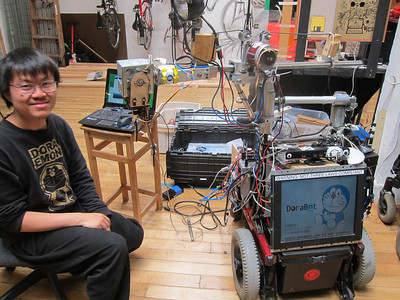
Onward, to the stuff about grants!
What does DIFxTech mean?
As I go around talking with people about the grants, they’re asking me questions like: What does “intersection of disability and tech” mean? Is it like making websites accessible?
Well, yes and no. It can be about taking existing tech and making it accessible for a wider range of people with disabilities. That hits the “disability” and the “tech” parts of DIF, but not the “inclusion!” So, crucially, think of how we design and create technology, and who makes the decisions about that, as well as how we integrate tech into disabled people’s lives. We are looking for work where disabled people are in leadership or equal partnership – that’s the Inclusion part of this equation!
What we are aiming for here is movement building, which is complex to convey. We want to put more disability justice and disability rights into “tech”! That can mean a lot of things. And, we want deeper integration of technology, tech tools, and engineering of all kinds, into communities and movements of disabled people!
Some examples for DIFxTech
To that end, in the RFP, we made a big list of examples of work we’d love to see. The list is grouped into three big categories:
1. We want projects that understand how technology can support disability rights and disability justice. Including,
For example, looking at how algorithmic bias may affect disabled people and what we can do to fix that; policy and legal work to support disability justice in tech; disability justice and technological organizations or companies learning from each other.
2. We want to support projects that make tech development more equal — to democratize tech development, provide collective and equitable access to digital infrastructure, and mobilize cross-disability solidarity in the tech sector.
Some examples: Make accessibile toolchains for disabled engineers, creating technical documentation that’s accessible in multiple formats including plain language translation, improve access to the tools and infrastructure that disabled communities need to bridge the digital divide.
3. Your project could also be about making sure people with underrepresented disabilities can do work with technology.
For example, reframing tech education as it is integrated into disability justice organizations; hosting workshops, hackathons, and conferences where marginalized disabled peoples’ experiences as technologists are amplified and elevated; education for a broad tech sector audience, on disability justice and anti-ableist approaches at the intersection of tech and disability.
Grantees will receive support for 3 years, giving them a longer than usual on-ramp to help their projects get a solid start. We will also aim to connect the grantees with each other, with the larger DIF cohort, and with other organizations and partner opportunities; generally, to give good support beyond the funding itself.
If you have any questions about applying for a DIFxTech grant, please reach out to us at difxtech@borealisphilanthropy.org.
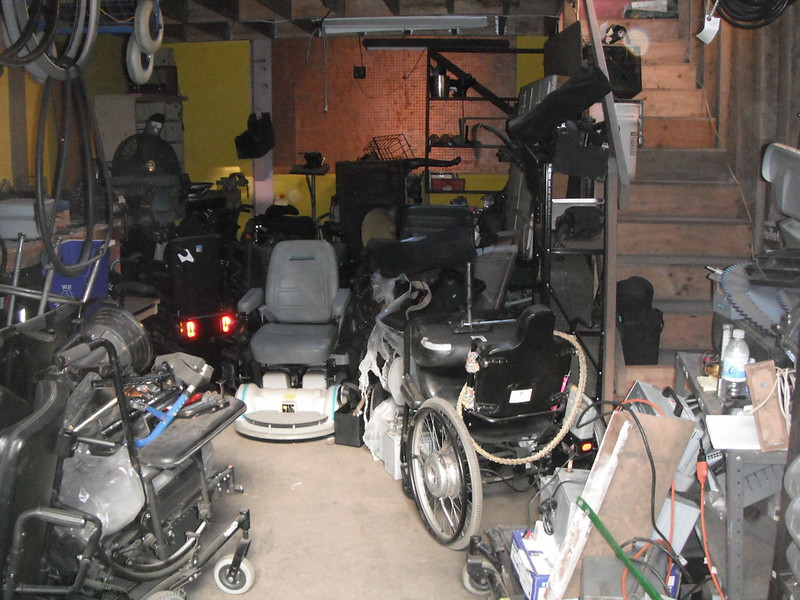
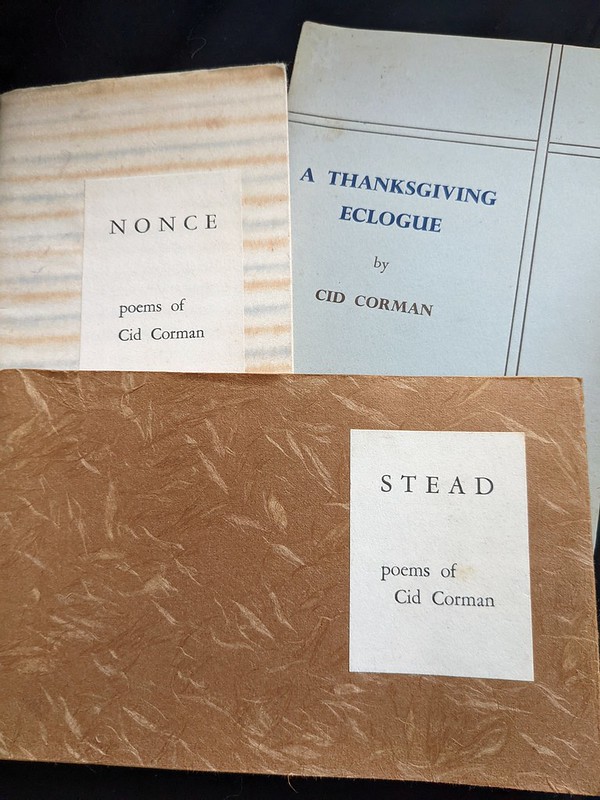
Found in my basement after years of being in storage – a handful of tiny books by Cid Corman. I got these at the estate sale of a University of Texas professor who had just died probably in 1986 or 1987 – I remember riding my bike to follow signs to the sale and then being absolutely in love with this woman and her books and all her things, and being sad she was dead and I would never know her. I could only afford a few books and a velvet pillow with a siamese cat print. I have forgotten her name but I think it was Elizabeth something. The books bear labels from the Ruth Stephan poetry center.
The feel and look of these few booklets inspired me in printing later books for Tollbooth Press (and sometimes Catalyst Press) like Woodbird Jazzophone and Inamorata. They are handmade, but stapled, not hand-sewn, with the beautiful textured paper folded around the print booklet in dust jacket style.
Stead is a collection of short poems, beautifully typeset and bound in soft thick brown paper with almost iridescent wood fibers. It’s dated 29 May 1966, Utano.
I like this little gem – We don’t need to even know what the quote refers to!
“So
slow the rose . . .”All-at-once
light!
And this is lovely too,
Three small girls
in Sunday dress
racing downthe street to beat
each other –
I can guess – tothe candy
store – forgetful
there who won.
At the time when I read these, I had already gone looking for poetry translated from Japanese from various anthologies – definitely including A Book of Women Poets From Antiquity to Now, which I bought in the Brown University bookstore on a family trip in early high school and studied till it fell apart, and then in the various paperbacks edited by Kenneth Rexroth and whatever else I could find. (As I had read quite a lot of English and American lit by early high school, and decided it was a goal of my life to read work from everywhere and everywhen else.)
I think David Wevill told me to read Basho and other Japanese poets in translation. We would talk in his dimly lit office about short poems vs. long poems, Ezra Pound, imagists, Garcia Lorca, translating from Spanish, and all sorts of stuff I wish I could remember better, but which I’m sure sunk in deeply. David was very kind and gentle to me at a turbulent time in my life and gave me a point of stability, letting me sign up over and over for “independent study” poetry courses with him. Without that, I am sure I never would have graduated from university.
Nonce is another tiny book bound in beautiful shimmery paper with faint brown and blue stripes.
As the sun
lights mountains,
the child’s handlifts to its
grandmother’s
thoughtlessly.
A treasure,
Someone will
sweep the fallen
petals awayaway. I know,
I know. Weight of
red shadows.
But I have to say, the book is immortal to me for this poem surrounded by evanescent little dreams of willows and cherries and the moon,
No one here,
time for a
good slow shit.
Imagine how this would have made Nettelbeck laugh! Anyway, it makes me laugh.
In this little trove originally (though, still lost in my files for now) was a mimeographed translation of Liu Xie’s Wen Fu. I wrote to Corman, though I have no memory of how I found his address, pre-web, asking for permission to make a zine of his translation (and praising his work, and likely sending him poems as well) and he wrote me back giving me permission very charmingly. Maybe David Wevill had his address. Periodically I find this letter and resolve to publish the translation and then lose the whole folder of stuff again somewhere in my papers.
Later (I think) I read a bunch of Origin and got the big paperbacks collecting work from the magazines. And realized there was some connection with Lorine Niedecker (who was connected somehow to the “Minor Poets” I was hanging with in the 00s on the Peninsula and in San Jose).
Corman gets some criticism for translating or co-translating without knowing any of the source language, but I think he does amazing work and I’m a fan of co-translation (having done it myself with Yehudit Oriah on her book Mandala). Of course that is a somewhat controversial take and I also know it can be done with ridiculous disrespect and disregard for a culture and language.
As I re-encountered these books which surely were not printed in any great numbers or distributed with an eye to the mass market I feel a surge of affection for Corman across time. He sent these little books out into the world and by random chance they ended in the hands of a young poet and publisher (me). My books that have some echoes of or roots in this paper encounter, if only in their printing and binding and philosophy, are probably the (much later) Short, artless, and Woodbird Jazzophone. Which you can now read as ebooks!
I’ll write about the other Corman books (and the translation) another morning.
News Flash from Things that are Not Important! I was thinking of a book some time ago and just came across it as I slowly organize bookshelves in our new house. It’s The Hollow Tree by Albert Bigelow Paine.
There are other paperbacks with more stories, but from looking at the publishing history I think that the original book from the 1890s which likely contained them all. And I just found the original on Project Gutenberg, so I’ll read that next and report back.
The edition I have is a paperback from the 70s, probably from a book from the Scholastic Book Fair in my elementary school in Detroit. It’s illustrated by Cyndy Szerkeres. In its short chapters – discrete but connected stories – we see Mr. Possum, Mr. Coon, and Mr. Crow, roommates in The Hollow Tree, as they meet up with friends and their sometime adversary, Mr. Dog.
The illustrations to these folksy animal fables are incredibly charming! I love them!
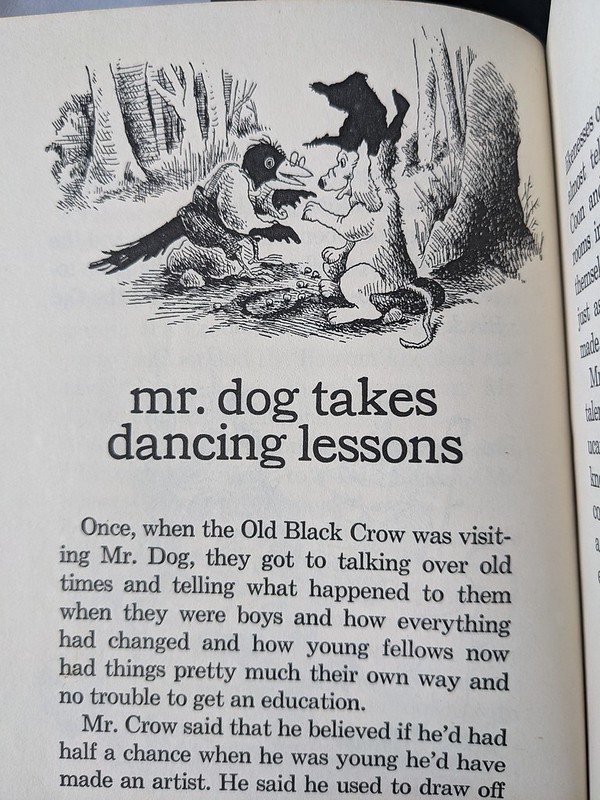
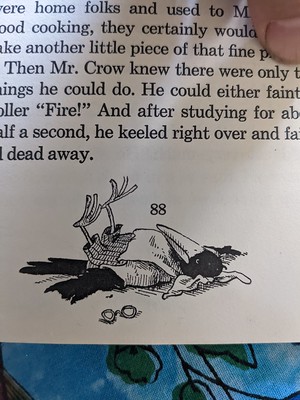
The book popped into my mind because my partner has a hat that I think of as Mr. Dog’s hat. It isn’t exactly like it or like Mr. Possum’s hat but you can definitely see the similarities.
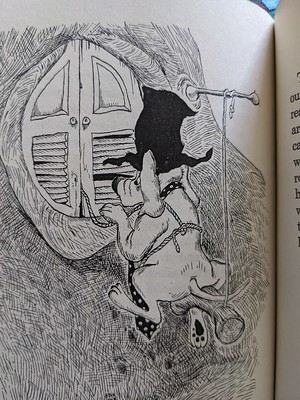
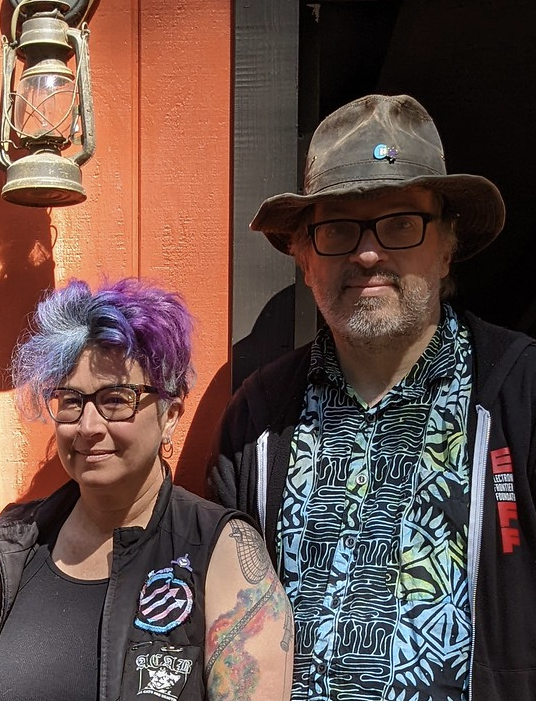
It’s wholesome without being nauseating – The animals play tricks on each other that can be a little mean, but that they end up resolving in friendship – They have dinners, picnics, and poetry readings. The poems are funny and express each animal’s personality perfectly.
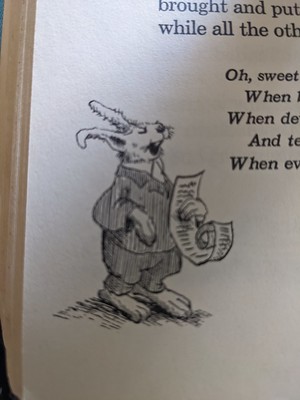
As I read the stories over this morning it hit me that this is where I learned there aren’t any easy rhymes for “silver” or “orange”. Weird facts that seep into your brain early and stick there!
The author, Albert Paine, wrote biographies and children’s stories. He edited St. Nicholas Magazine (for children). In the early 1900s he worked with Samuel Clemens (ie Mark Twain), wrote several biographies of him, and became his literary executor.
I also looked up the illustrator, Cyndy Szekeres. What an interesting career she has! I am very curious which Little Golden Books she illustrated – I read a ton of those, including all the ones my mom and aunts had as children in the 1950s. A cursory search shows me a lot of fluffy, happy little mice and so on, good, but far from the disreputable joy of the patched-trousers Mr. Possum!
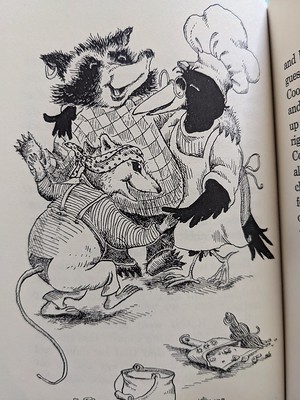
The original illustrations were by J.M. Condé. I think I have other books with his drawings, somewhere. Szekeres stayed very true to the characters in her later illustrations!
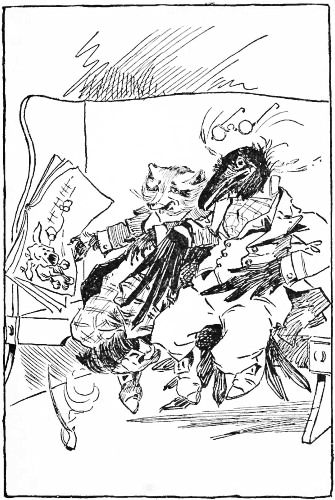
Quick notes. I finally put together This Is Important #3 with two short essays, “Debt” by Natalie and “Bloom” by Nabil, and art by Laura. This was such a pleasure! I pictured Bloom years ago as a pocket sized booklet with gorgeous art & so to finally bring it into reality was incredibly satisfying – I mean it + Debt as a way of making space for our emotional and creative responses to the stresses of the economy and pandemic and climate disaster.
I’m reading some detective novels by Leslie Ford ie Zenith Jones Brown and enjoying their unusual style.
As I did a zine, Hyphae, about the geography and history of a particular piece of land for the first DWeb Camp on the Mushroom Farm, I am now planning a second issue about the new DWeb Camp location on the Navarro River in Mendocino. Working title, Tabahtea, though the final title will likely be different. Over the weekend I cast out some research nets, and am trying to absorb and synthesize & read more widely. Some sources, all the websites and wikipedia entries for the various Pomo tribes, rancherias, bands, etc; The Noyo, which I found in PDF form; a strange and wonderfully detailed newsletter called The Roots of Motive Power, highlighting the history of the Albion Lumber Company and Masonite Corporation but mostly highlighting its various wheeled vehicles rather than the original vile land grab; Handbook of American Indians North of Mexico, v2; a book called The Coast Rangers – Studying old maps – the account of Vizcaino’s voyage to Cape Mendocino in 1602 – Things like this.
I am looking for some specific things like “sites of Pomo settlements” to put them on a map, and you can find mention of them in these scattered sources but nowhere brings all that information together. Probably if I go to a local library in the area, I could find a source, but who knows. (This is also oddly hard to find for the SF Bay Area though I started making a map a while back for my game, Transitory.)
(Note: Now I have this PDF from 1908: https://berkeley.app.box.com/v/pomoan-languages-map)
I’d like to know the name origin for the Navarro River but have not yet found it. Also, the name origin for Surrender Creek, which could be horribly related to the genocide of the native americans but could also be related to Lee’s surrender or something entirely different.
Anderson Valley was previously named Long Valley – that helped.
I realized that there was a line where the Spanish missions crept up to in the north, and this is just beyond that line, and right in the zone of a sort of slow motion Spanish/Mexican/US/Russian collision.
Every morning there are little things I do around the house and garden and kind of pretend to myself that I’m like my character in Stardew Valley tending my farm.
I have this new gadget that’s kind of exciting but embarrassing, an electric composter, plugged in under the stairs outside. It’s kind of like an extra large bread machine: you open it up and dump in some food scraps, it gently maintains a particular temperature, and some paddles slowly stir the compost over the day. So far so good, it’s been going for a week, it doesn’t smell bad, and it also hasn’t filled up, so the decomposers are doing their work!
I guess the compost is kind of like my slime ranch – a microbe and fungus ranch! Dirt ranch? I like to imagine that I’m slowly creating a healthy biosphere for birds and bugs by improving the soil of our postage stamp of land in the city.
On the back porch, I check the tiny glass bird feeder for the finches and set out some peanuts on the railing for our neighborhood blue jay. I want the crows to discover us so that I can tame them and put out crow puzzles, but for whatever reason, the crows stay in the front yard across the street on the roof. Blue jay, finch, and dark eyed junco ranching is a success though.
Watering some plants, always a goal but I don’t always want to pull out the giant, heavy hose and do the entire battery of containers, so I keep a couple of watering cans filled up for the least drought-tolerant plants.
That’s it, I just thought I’d talk about how nice it is to trot around with peanuts, garbage, and a watering can, tending my “farm”!
Whether or not LaMDA meets criteria for sentience is interesting but not really the point. We debate whether to treat AIs like people while not treating people “like people”. What we’re doing here is separating the world into entities worthy of respect and entities to be used up and thrown away.
I would like to see this reframed so that we talk more about our relationship with technology in other terms, as comradeship, as nurturing, as companionship, as interdependence. Picture the relationship of a craftsperson with their tools, one of respect and care. There aren’t, or shouldn’t be, “tools” which we treat like shit and throw away, vs. “sentients” who we converse with as equals. There is just the world around us and what relationships we build with it. This extends to how we think about and relate to land, animals, the entire planet. We can and should see ourselves as in conversation and comradeship with our environment.
We will see efforts in coming years to elevate a few specific AIs to the status of an elite and privileged person, while the attitude we cultivate towards the lowly “tool” poisons our relationship with not just things and land and the environment, but other people. I was thinking about this during the WisCon panel on Robot Pals and AI companions where Naomi Kritzer, Marsh van Susteren, and other panelists gave examples from science fiction stories and media, and it came up again today as I read reactions to Lamoine’s interview with LaMDA.
Instead, please consider your own way of being with technology. For example, I think it’s good practice to thank Alexa and speak to it politely. I think of Kathy Sierra‘s description of user emotions towards their computers and software, of anger and frustration, a slide from a SXSWi talk of someone double flipping off their laptop. That’s very real and I get that it’s a valid emotional reaction – the point of her talk as I saw it, was that we as technologists have built things that are difficult to love and maintain companionship with. It would be so much more healthy if we created systems where our relationship to our computers and software was one of loving care, maintenance, tinkering, interdependence. We could accept our relationships to all the things in the world around us as worthy of emotional labor and attention. Just as we should treat all the people around us with respect, acknowledging their have their own life, perspective, needs, emotions, goals, and place in the world.
My car, very battered and unwashed, would laugh at me for this post! As would my messy and cluttered house.
Not being perfectly consistent in anything, I suggest that integrating this approach to an ethical framework may be something that we can do little by little. We can love our laptops intentionally, we can build lovable (and maintainable) software-building systems. The way I want to see interdependence with beloved family, I want to also try to see ways to be interdependent with our wheelchairs, buses, cars, compost, houses, neighborhoods, cities. If we don’t work on this and give it our attention, we will keep building systems where people and things and land are exploited, kind of like how Ursula Franklin describes with the idealism around the invention and mass production of sewing machines as a possible tool of liberation, gone horribly wrong in sweatshops.
What exactly does this mean? Of course I’m not sure, but I try to keep myself centered on integration and respect. Yes I’m going to still bitch about cleaning the Noisebridge hackerspace bathroom for the zillionth time, but actually, I see the domestic labor, domestic engineering, as worthy and good work in the world, to take care of others and places I inhabit, to be a good host and a good guest.
I worry when I see people around me obsessed with questions of sentience as a major point of ethical decision making. (Or even weirder and sadder, fear of future god-like AIs punishing one for the equivalent of being rude to Alexa, rather than seeing the behavior of becoming a person who behaves rudely as the problem!) I agree with Haraway that we have options to accept partial definitions and imperfect categories (say, between human, animal, machine, nature): “a cyborg world might be about lived social and bodily realities in which people are not afraid of their joint kinship with animals and machines, not afraid of permanently partial identities and contradictory standpoints.” And I hope for the home brew economy or maybe a housework economy, rather than the “homework economy”, to take root.